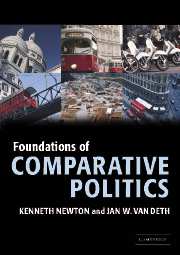Book contents
- Frontmatter
- Contents
- Acknowledgements
- List of briefings
- List of fact files
- List of controversies
- List of tables
- List of figures
- List of abbreviations and acronyms
- Key terms and concepts
- PART I The state: origins and development
- PART II The polity: structures and institutions
- PART III Citizens, elites and interest mediation
- PART IV Policies and performance
- Glossary of key terms
- Index of names
- Index of subjects
PART III - Citizens, elites and interest mediation
- Frontmatter
- Contents
- Acknowledgements
- List of briefings
- List of fact files
- List of controversies
- List of tables
- List of figures
- List of abbreviations and acronyms
- Key terms and concepts
- PART I The state: origins and development
- PART II The polity: structures and institutions
- PART III Citizens, elites and interest mediation
- PART IV Policies and performance
- Glossary of key terms
- Index of names
- Index of subjects
Summary
Part II of this book has discussed the formal institutions of government. Part III now looks at the politics of everyday life as practised by people – ordinary citizens and political leaders. The division between parts II and III implies a distinction between the structures and institutions of government, on the one hand, and the political attitudes and behaviour of individuals, on the other. Sometimes a similar sort of distinction is drawn between government institutions and structures, which are relatively fixed, and political processes, which are dynamic. At other times, a distinction is drawn between macro- and micro-analysis. Macro-analysis is concerned with large-scale phenomena, and often compares countries or broad sweeps of historical change. Micro-analysis deals with parts of the whole, usually the smallest ‘unit’ of political analysis — the individual. For this reason much micro-analysis often studies individual voting behaviour, or uses survey analysis to study attitudes and behaviour.
The distinctions between institutions and behaviour, between structures and processes and between macro and micro, are useful for studying government and politics, but we must always remember that they are simply different aspects of precisely the same thing. Structures and institutions set a framework for everyday political life; political attitudes and behaviour help to shape structures.
Part III starts with an account of the political attitudes and behaviour of individuals. If we understand what people think and believe about politics we are better able to understand their behaviour.
- Type
- Chapter
- Information
- Foundations of Comparative Politics , pp. 133 - 134Publisher: Cambridge University PressPrint publication year: 2005



